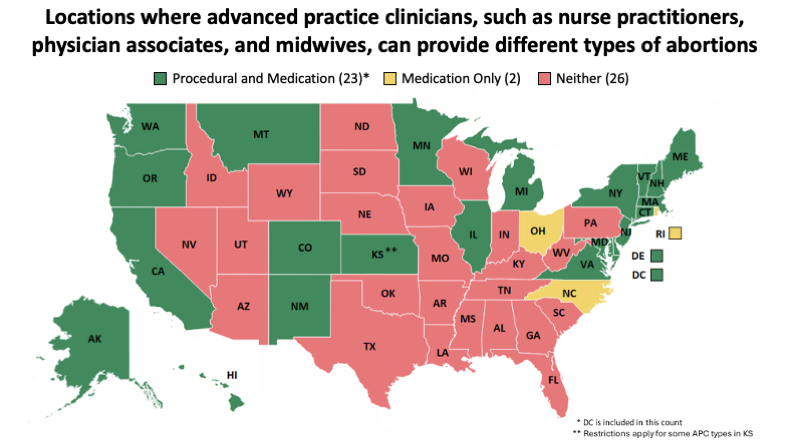
Abortion laws, many of which were enacted before both the expansion of advanced practice nursing and the development of simpler abortion techniques, create hurdles for clinicians who want to offer abortion care. Although these laws were primarily designed to protect patients from unsafe, untrained, and unlicensed providers–not meant to prohibit the evolution of scope of practice–they have become a de facto restrictive legacy.
Even in states where NPs, midwives, and PAs have a broad scope of practice, abortion is sometimes carved out. Abortion-specific limitations may prevent clinicians from offering either aspiration or medication abortion care.
Nevertheless, in nearly one-third of the states, NPs, midwives, and PAs are safely and effectively providing medication and/or aspiration abortion care—either because the state does not have a physician-only law or because the physician-only law has been narrowly interpreted by the state Attorney General, a regulatory body, or some other entity.
Even in states where abortion is restricted by law to licensed physicians, there are nonlegislative strategies that clinicians can pursue to try to gain authority to incorporate abortion care into their practices.
These state-specific abortion laws must be considered within the context of nursing, midwifery, and physician assistant practice acts which also vary from state to state. Although the state regulation of practice will be discussed generally, it is beyond the scope of this Toolkit to provide detailed description of each state’s practice acts regulating advanced practice nursing roles (e.g., NPs and CNMs) and PAs. Fortunately, there are regularly updated reference documents that provide current state-by-state information practice regulation including state practice acts and legislative changes to scope of practice.
State Laws and Regulations Governing NP, Midwifery, and PA Practice: Where to Find Information
Since there is no federal law governing scope of practice, it is necessary to go to each state licensing board to access the specific practice act and rules and regulations. Fortunately, there are websites which summarize and update these state practice laws and regulations.
Nurse Practitioners
Since 1988, The Nurse Practitioner has provided an annual APRN legislative and regulatory update including a recap of each state’s nurse practice act and related rules and regulations pertaining to CNPs (certified nurse practitioners) with limited information pertaining to CNMs, CRNAs, and CNSs. The “Annual Legislative Update” is available in both print and electronic formats with a condensed version of each state/DC/US Territory report appearing annually in January. The electronic version of “The Annual Legislative Update” is available to the public free of charge.
The American Association of Nurse Practitioners (AANP) also provides information on state practice environments for NPs in an electronic format. Public access includes state information pertaining to the regulatory structure and agency, licensure requirements, a link to the Nurse Practice Act, and links to state NP organizations. AANP members have electronic access to State Policy Sheets which provide additional information on continuing education requirements, medical staff membership, collaborative agreement ratios, and signature recognition.
Midwives
The American College of Nurse-Midwives (ACNM) provides information on state laws and regulations specific to CNMs and CMs. ACNM’s State Fact Sheets and Legislative Tracking Tool are available online to ACNM members only. Topics include the identity of the regulatory board, scope of practice, prescriptive authority, recognized midwifery credentials, Medicaid coverage, and other statutory provisions governing the practice of midwifery.
Physician Assistants
The American Academy of Physician Assistants (AAPA) regularly revises Physician Assistants: State Laws and Regulations with the most recent edition available online. This resource provides summaries of more than two dozen key provisions of each state’s statute and regulations complete with legal citations. The AAPA website also provides contact information and links to each state PA regulatory agency.
